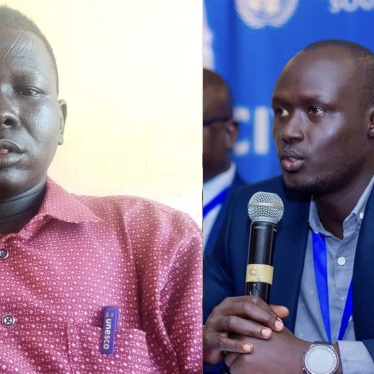Human Rights Watch welcomes the adoption of the outcome of the Universal Periodic Review (UPR) of Rwanda, which comes at a critical time. At the end of 2015, Rwanda revised its constitution to allow President Paul Kagame to run for a third term in the 2017 elections. A large majority of Rwandans voted in favor of this change in a referendum in December, but the context of tight restrictions on freedom of expression makes it difficult to know how many genuinely supported this move.
We therefore welcome Rwanda’s support for the recommendations to eliminate all legal provisions that undermine freedom of expression and to ensure freedom of opinion and expression; an environment conducive to political debate is a precondition for free and fair elections. During the review, the Rwandan delegation also stated the government’s willingness to engage in a discussion on freedom of assembly and promised to strengthen its policy on human rights defenders.
The Rwandan government considers several recommendations on freedom of expression and association, affecting civil society, political opposition and the media as having been implemented. However, in practice, independent civil society groups, opposition parties and independent media have very limited space in which to operate freely. Rwanda has adopted improved media laws since the last UPR, and some radio stations have begun broadcasting more critical programs and debates. However, additional measures to protect journalists are still needed. In the last few months alone, several journalists have been harassed or detained, apparently in connection with their critical reporting. The Rwanda Media Commission, a self-regulatory body praised by the Rwandan delegation for bringing about an increase in journalistic freedom and a reduction in the prosecution of journalists, suffered a setback after its chair resigned in May 2015 and fled the country because of threats. One of the most serious concerns relating to media freedom is the government’s indefinite suspension of the British Broadcasting Corporation’s (BBC) Kinyarwanda service in Rwanda, following a controversial BBC television documentary broadcast in October 2014. The suspension deprives Rwandans of one of the few independent sources of information, commentary and debate in their own language.
The strength of civil society organizations is not defined by their number, but by their ability to act and speak independently. This ability remains very limited in Rwanda, due to government interference, intimidation and administrative hurdles, as well as a climate of self-censorship. Opposition parties struggle to carry out their activities and several opposition leaders remain in prison.
In a positive sign, the Rwandan government accepted a recommendation to conduct investigations into cases of alleged arbitrary arrest, detention and enforced disappearances. Human Rights Watch has documented several such cases in the period covered since the last UPR in 2011. Rwanda should proceed with the ratification of the International Convention for the Protection of all Persons from Enforced Disappearance, which the government categorized as “implemented or in the process of being implemented”.
Rwanda also considered a recommendation to investigate allegations of torture and ill-treatment during interrogations in detention facilities as implemented. However, Human Rights Watch has documented several cases of torture and ill-treatment by state agents in such centers during the period covered by the UPR (2011 – 2015), and is not aware of investigations into these cases. On the basis of its research, Human Rights Watch believes that the Rwandan authorities have many further steps to take before this recommendation can be considered implemented. Human Rights Watch has observed several trials in which defendants alleged in court that they had been tortured. Yet the judges did not order investigations into their allegations and the trials proceeded.
Human Rights Watch notes that Rwanda accepts to comply with existing laws on detention and to implement further legislation on transit and rehabilitation centers. Since Human Rights Watch’s September 2015 report on the Kigali Rehabilitation Transit Center in the Gikondo suburb of Kigali, Kigali City Council has issued a new directive regulating the center. The directive, published in November 2015, contains several positive elements, but a number of fundamental concerns remain, such as the lack of judicial oversight, the scope for arbitrary arrest and detention, and unaccountability for past abuses at the center.
Only two weeks ago, on February 29, Rwanda withdrew its declaration allowing individuals and non-governmental organizations direct access to the African Court of Human and Peoples’ Rights. This move contradicts Rwanda’s statement during the UPR that it supports international justice. Rwanda should reverse this withdrawal, to demonstrate its commitment to strengthening regional and international human rights institutions and broadening access to justice.





